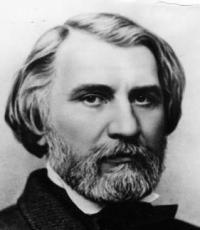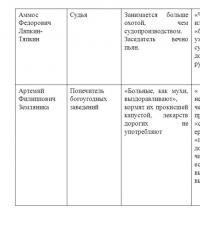What is the state of affairs of the auditor's officials? Officials in Gogol's comedy The Government Inspector
The characterization of officials in The Inspector General by Gogol is given at the very beginning with the help of a folk proverb, which served as an epigraph to the comedy: “There is nothing to blame on the mirror if the face is crooked.” This capacious image allows us to penetrate into the essence of the multiple "face" of bureaucracy, as the force that flooded the Russian space of the first half of the 19th century and enslaved it. Comedy was supposed to become a kind of "mirror" in which you can see all the nuances of social ugliness. As a true artist, Gogol understood that it is best to indicate the scale of this disaster not by directly condemning it, but by placing it in a context where it would be accompanied by a laughable beginning all the time.
All officials in the auditor are united by an immoderate passion for acquiring, while it doesn’t matter what: money, power, undeserved respect. These are minor parts of "little thanks", so small that they are not worth talking about. The craving of Russian society for traditional values gave rise to a situation where it was tradition that paid off conscience. As ancient as the world, bribery itself became a world whose laws must be inviolable. In such a world it is easy to deceive and be deceived, which makes honesty seem offensive. The bureaucracy in The Inspector General looks grotesque also because the absurdity of their life is full of “claims” and righteous anger: it forgives nothing and no one for the disrespectful attitude towards themselves, which every Russian citizen should have almost intra-blood.
The images of officials in the comedy "The Inspector General" are as ridiculous as they are monstrous, because they are truthful and widespread in all spheres of the then public life. The mayor Skvoznik-Dmukhatsky, of course, is not stupid, like a gray gelding, he is well aware of the unattractive situation of the inhabitants of his city, the deplorable state of medicine and education. But the derivation of one's own benefit prevails with the mayor over everything, and the arrival of the auditor was supposed to block the process of absorbing resources and patching holes after that. Fear blinds the mayor so much that he takes Khlestakov's cowardice and emptiness for subtle deceit with which a passerby pretends to be an auditor. Skvoznik-Dmukhatsky never feels not only guilt, but even embarrassment at the moments when he is “thanked”, because the ghost of supposedly God's providence has long since justified everything. No one dares to go against the divine will, except perhaps some Voltaireans. Among the venerable officials of the county town, such a disgrace should in no case be. He is not!
The absence of the Voltairian shame also frees one from intelligence and education. Ignorance is so invincible that no enlightenment can move it from its place, like a city judge who takes bribes with greyhound puppies for future hunting. Several books that Lyapkin-Tyapkin read all his life, of course, gained him the fame of a freethinker, but they did not add anything to his meager consciousness. He is not only unable to do the job, but also to be responsible for his judgments, which have long ago, and perhaps from the very beginning of his career, been abolished by the authorities with something like: "a lot of intelligence is worse than it would not be at all."
Strawberry is clearly visible in the ranks of the officials of the city of H in the "Inspector General", who with all zeal takes care of charitable institutions. He is a terrible rogue and knows how to speak to the hearts of those in power, which always ensures his brilliant success. The guardian considers flattery the most indispensable and unmistakable means for penetrating into another's soul and uses it on the widest scale. He fawns over both the mayor and Khlestakov, subtly capturing the nature of their pride and fear. The superintendent of the schools Khlopov is inferior in flattery to Strawberry, he does not do it so skillfully, but with great success he complains to the mayor about teachers who allegedly spread free spirit among the younger youth, they are too insultingly hot and educated. That is why all the officials from The Inspector General are so representative, so brilliant in their stubbornness, because each of them is part of a bribery system that kills everything human, original and reasonable.
The images of officials in the comedy The Inspector General are complemented by such characters as Bobchinsky and Dobchinsky, rogue gossips who are in an endless search for amazing news. They scurry through the whole comedy as pranksters and jesters, whom no one puts in anything, but everyone endures - for the opportunity to be the first to find out an interesting incident, no matter what it concerns. One of them always accompanies the mayor to Khlestakov, then crumbles in courtesies in front of Anna Andreevna, then obsequiously stutters in front of the auditor. Ultimately, in all forms they do not change, demonstrating the lowest level of mental poverty and insignificance - a petty official who, by virtue of his position of affection, and give him power in his hands, will tear anyone to pieces. Dobchinsky and Bobchinsky themselves experience almost pleasure from trembling before the authorities, because “fear still penetrates when you speak with a nobleman,” and this fear does not seem humiliating at all. It is perceived as a source of low pleasure.
And, finally, Khlestakov himself is the embodied clerical emptiness, who lost at cards and, due to circumstances, assumed the role of an auditor. Khlestakov is subject to filling by its very nature, therefore it does not matter to him who he will be in the next moment, because the mayor’s intentions do not immediately reach his consciousness. He accepts admiration and generously gives everyone his attention as a person who does not need to be told about his irresistibility. His threats are ridiculous and boyish, but this is precisely what causes Skvoznik-Dmukhanovsky's suspicion, and then confidence - this visitor is simply skillfully cunning, he is the auditor!
In these relations, we see the end point of the absurdity of the bureaucratic world: the fear of the powerful force paralyzes a person, makes substitution possible and gives prosperity to ignorance. Only cleansing laughter can help break out of this circle - the only positive character in Gogol's comedy.
Artwork test
"The Government Inspector" - a comedy by N.V. Gogol. As the author himself wrote, he wanted to show and, at the same time, ridicule all the shortcomings of bureaucracy and the injustice that reigns in remote places in Russia. The comedy reveals all the "sins" of city officials who are trying to hide them from the auditor, who is supposed to visit them. N.V. Gogol does not introduce a separate main character into his work, he draws the image of each official, describing the shortcomings of the political system.
Mayor appears before us as a not stupid person, but for many years of service accustomed to deceit and steal. The character himself admits that no one can fool him, but he deceived a single governor with dexterity. Anton Antonovich takes into his pocket the money that was allocated for the needs of the city. The mayor knows about all the "dark deeds" that are happening in the city. But he justifies this by saying that all people are sinful by nature. He conducts a preventive conversation with his subordinates, so that before the arrival of the auditor, they hide all the shortcomings. He wants to curry favor with his superiors, but he does not care about solving the problems of the city.
Other bosses are in no way inferior to the mayor. Judge Lyapkin-Tyapkin a scoundrel who tries to serve his superiors in everything. He loves hunting and takes bribes with greyhound puppies. Regarding health care in the city, he says that expensive medicines will not help a person who is destined to die, so there is no need to spend money from the city treasury on them.
Khlopov- superintendent of educational institutions. He is afraid of various checks and constantly complains about how hard his job is.
Shpekin, who takes the place of the postmaster, opens letters to unknown recipients. He justifies this occupation by the fact that he wants to know what interesting things are happening.
The entire leadership of the city is engaged in bribery. They do not care about the lives of ordinary people. They put themselves above them and run the city as they please. Officials do not look at the law and the needs of the inhabitants. When the news comes about the arrival of the auditor, the officials are not particularly worried, they try to cover up their misdeeds outwardly, but they understand that the problem can be solved by bribery. The inspector visits the city not for the first time and the authorities know how to behave and what to say in order to get away with it. After all, they serve in their ranks and rule the city for more than a year, and they get away with everything. Through bribery, lies, open flattery, they remain in their places even after various checks.
The dominant persons let slip about their misdeeds, tell several stories from the life of the city. And thanks to this, a complete picture of what is happening in the Russian provinces is emerging. The authorities arbitrarily govern the city, take bribes, often gossip and write denunciations. The rights of citizens are infringed, the living conditions are terrible, and the administration turns a blind eye to this. The life of counties and provinces is reflected in the play by N.V. Gogol. The author denounces all the features of the system of Russia.
Composition Officials in "Dead Souls"
Nikolai Vasilyevich Gogol is the author of Dead Souls. Throughout the reading of the entire work, it becomes clear that all landowners and noble people are interconnected. For each of the landlords, first of all, bribery is characteristic, as well as the desire to make their property on someone else's grief.
There is no doubt about the professionalism of Nikolai Vasilyevich, since he simply skillfully reveals each landowner, exactly as they were in those days. All the disgust of each of them is described in such detail that each reader can find out in more detail what the landowners were in those days, in the city in which all the actions took place, in the work Dead Souls.
The story shows the main problems that arose in the Russian Empire at the end of the 19th century. Not only serfdom was a significant problem for the empire, but also the power that was given to officials brought big problems, because simply huge sums from the state treasury were allocated for their maintenance. In the 19th century, people who had power, first of all, tried to enrich their fortune and did not even look at where this money came from, from the treasury or from the theft of ordinary people.
The desire to reveal the topic with regards to theft and ill-treatment of officials, many authors wanted to reveal, including Nikolai Vasilyevich Gogol. All actions in the work take place in the city of N, that is how the city was named, in order not to reveal the real name, or in accordance with the motive that the city did not actually exist and was fictional.
Reading the first lines of the work, one can understand that there is no exact description of the landlords and officials of the city. But, despite the lack of a description, their way of life, as well as the characters, are very accurately shown by the author. Chichikov, is the main character of the work, who has a desire to visit every noble person of the city, in order to arrange all the people who have power in their person. As he visits each noble landowner, Chichikov begins to develop a trusting relationship with each of them.
In the world of landlords, there is always an unbounded pomp and at the same time pathos, referring to every person in a city with great power. One example is a sumptuous dinner at the governor's, but the decor and bright lights were only compatible with a ball that is arranged in palaces.
The county town reminded the reader more and more that all landowners are divided into two types. For example, the first type includes landowners who devoted all their free time to entertainment and whipping young ladies, while trying to compliment them as romantic and gentle as possible, at the same moment the second ones, with great passion and desire, accepted the received compliments. However, despite the large number of boyfriends in the city, no one could ever even think of challenging any person to a duel, it seemed strange and inhuman to them. In the same way, they behaved when it came to money, first of all they tried to line their pockets and carry out some kind of scam with another person in order to get rich.
They did the same during lunch, they did not pay much attention to all those circumstances that were not interesting to them, on the contrary, they tried to discuss, for example, officials who were in other departments, important actions that they performed in their service. In addition to everything, they discussed various writers, poets and talked about what kind of dinner would be served to them now.
Composition for grade 8
Some interesting essays
- What does the story teach the Caucasian prisoner Grade 5 essay
What this story taught me. The story Prisoner of the Caucasus is based on a real incident that happened to Colonel F.F.Tornau. The officer was taken prisoner during the war, as the Russkiy Vestnik magazine wrote.
- Female images in Gogol's Inspector General essay
Nikolai Gogol wrote a wonderful comedy in five acts, in which women play an insignificant role, they are no different from their husbands, but simply complement this picture of vulgarity
- Composition based on the painting Blue Spring Baksheev 2, 3rd grade
A beautiful picture with a beautiful title. Why is spring blue and not green? It's the color of green. Usually spring is always associated with young greenery. I think that it's just that greenery does not appear immediately. But the sky is so blue-blue only in spring.
- Analysis of the chapter Sophia from the work Journey from St. Petersburg to Moscow by Radishchev
The chapter begins with words about silence. Beginning The narrative sets the reader up for reflection, which is interrupted by a conflict situation and negative emotions.
- Analysis of the work First Love Turgenev
The work of I. S. Turgenev “First Love” is imbued with his own love experiences that the author once experienced. For him, love is a violent force in any of its manifestations.
LITERATURE LESSON
Lesson topic:
" Officials of the city N" (According to the comedy of N.V., Gogol "The Government Inspector")
8th grade. Program
Textbook "Literature Grade 8" (authors: V. Ya. Korovina, V. P. Zhuravlev, V. I. Korovin. Moscow, Enlightenment, 2009)
Toolkit:phonochrestomathy for the textbook “Literature. Grade 6”, Publishing House “Prosveshchenie”, 2009; « Open lesson onLiterature: Russian classical literature (Plans, notes, materials): A guide for teachers / Editors-compilers: I. P. Karpov, N. N. Starygina. Moscow: Moscow Lyceum, 2001;
Lesson type: learning new material.
Lesson Objectives:
Educational:continue acquaintance with comedy, reveal the ideological meaning of the work, encouraging students to independently analyze the images of officials in Gogol's comedy and carefully read the details of Gogol's work; the formation of the ability to “hear sadness through laughter” and the desire to fight everything “bad in Russia”;
Developing: development of creative reading skills, oral coherent speech, thinking;
Educational: instill love for the word, love for Russian literature, educate patriotism, independence.
Task : the formation of creative, moral qualities.
Visibility and equipment:
texts of the comedy, interactive whiteboard "SMART Board", slides with the names of officials, "notes" on which the details of the portrait, replicas, qualities, characteristics of officials are written, S.I. Ozhegov's explanatory dictionary, illustrations for the comedy "The Government Inspector".
Method of learning new material: partially searchable.
During the classes
“In the “Inspector” I decided to collect
in one heap all the bad things in Russia,
what I then knew ... and for one
laugh at everything...
Through laughter ... the reader heard
sadness…"
N.V. Gogol
1. Organizational moment.
2. Communication of the objectives of the lesson.
3. Work with the text of comedy.
CITY. Collecting all known information about the city through frontal work:
Where does the comedy take place?
Why doesn't this city have a name?
What do we know about this town?
-What characterization does the mayor and Khlestakov give him?
(Suggested answers. The action takes place in a small county town, the name of which Gogol does not give. The indefinite location of the city, from where “if you ride for three years, you won’t reach any state”, gives it a convention, allows you to reflect in it all the social vices of Russia, to reach a high degree of generalization of all vices.That is why Khlestakov says about this town: "What a nasty town!"
However, we can judge the life of the city by the state of affairs in its institutions.
Tell me, about the life of which institutions in the city of N do we learn from the comedy?)
4. OFFICIALS.
a) At the head of each institution are officials. Who are the officials and what is their role in the city?
According to the dictionary of S. I. Ozhegov: “An official is a civil servant with a rank, official rank.”
Indeed, officials are the culprits of all the events taking place in the city, as well as the "culprits" of our today's lesson. We can judge the image of the city and the state of affairs in various institutions by the actions, behavior and spiritual qualities of those who manage and organize the life of the city. In Gogol's comedy, we are presented with officials of all the main departments of the county town of the early 19th century. Interestingly, officials throughout almost the entire development of the action of the comedy stick together. Why do you think? What connects them?
(Answer: GENERAL SINS AND FEAR OF THE AUDITOR).
They are separated only in the scenes of offering bribes to Khlestakov. Today we will separate them for the second time.
b) Attached to the board are cards with the names of officials from the comedy (AMMOS FYODOROVICH LYAPKIN-TYAPKIN, ANTON ANTONOVICH SKVOZNIK-DMUKHANOVSKY, ARTEMY FILIPPOVICH ZEMLYANIKA, LUKA LUKICH KHLOPOV, IVAN KUZMICH SHPEKIN).
The guys choose folded “notes” from the cylinder, on which the details of the portrait, replica, qualities, characteristics of this or that official are written.The challenge for every reader: find the "owner" of the artistic detail and attach your sheet to the board under the name of the official whose image it creates. Then 5 people come to the board, who check the correctness of the assignment, and each of them, connecting the details, builds his answer-characteristic of the official. All participants in the lesson are transferred into groups in accordance with the heading plate (the name of the official), the characteristics of which were compiled using their “notes”.
Here are the features that made up the characteristics of the heroes:
ANTON ANTONOVICH SKVOZNIK-DMUKHANOVSKY:
-Speaks neither loudly nor quietly, neither more nor less;
- “Have mercy, do not ruin! Wife, small children: do not make a person unhappy”;
-merchants "wait froze, even climb into the noose";
-married, has an adult daughter;
- in a silent scene, he stands in the middle in the form of a pillar with outstretched arms and his head thrown back;
- he owns the phrase: “What are you laughing at? Laugh at yourself!..”
AMMOS FEDOROVICH LYAPKIN-TYAPKIN:
- "A person who has read five or six books";
-takes bribes with greyhound puppies, does not believe in God, does not go to church;
- “speaks in a bass voice, with an oblong drawl, wheezing and glanders, like an old clock that hisses first and then strikes”;
- judge, collegiate assessor;
-since 1816 he was elected for a three-year term at the behest of the nobility and continued his position until now;
-offers to "slip" money to Khlestakov.
ARTEMIY FILIPPOVICH STRAWBERRY:
- "a very fat, clumsy and clumsy person, but with all that a sly and a rogue";
- trustee of charitable institutions;
- “A simple man: if he dies, so he will die; if he recovers, he will recover anyway”;
- "a perfect pig in a yarmulke."
LUKA LUKICH KHLOPOV:
Shy in front of the door of Khlestakov's room, trembling all over and unable to utter a word, and then flies out of the room at a run;
- superintendent of schools;
- has the rank of titular adviser;
- "rotten through onions";
-one of his subordinates "cannot do without making a grimace after ascending the pulpit".
IVAN KUZMICH SHPEKIN:
- “Just like the departmental watchman Mikheev, it must also be a scoundrel who drinks bitter”;
- “a simple-minded person to the point of naivety”;
- “does absolutely nothing: all things are in a big neglect, the parcels are delayed”;
- in a conversation with Khlestakov, he repeats the phrase all the time: “That's right, sir”;
- postmaster, court adviser.
c) Work in groups. Each group is offered questions to analyze the image of one official.
STRAWBERRY: How and why does Strawberry tell Khlestakov about the unrest in the city? Why doesn't Strawberry inform on the mayor? Why was he the last to introduce himself to the auditor?
SHPEKIN: How are things at the post office? Why is he printing letters? Why does Gogol in his "Remarks for Messrs. Actors" characterize him like this: "A simple-minded person to the point of naivety"? Prove it.
LYAPKIN-TYAPKIN: Is it possible to characterize him by the name of the judge? What? How are things going in the offices? What do we know about his career?
KHLOPOV: Why isn't Khlopov given a characterization in "Remarks for Messrs. Actors"? Make "Remarks" to his image.
SKVOZNIK-DMUKHANOVSKY: He says: "There is no person who does not have some sins behind him." What sins are found in the mayor? Why did the mayor believe that Khlestakov was an auditor?
5. After a group discussion and preparation of answers to the proposed questions, each group is given the floor.
The rest of the groups can make additions, corrections, ask questions to the respondents.
The result of this work is the conclusion that GOGOL HAD THE GIFT WITH THE HELP OF ONE DETAILS TO GIVE A COMPLETE CHARACTERISTIC OF THE HERO OF HIS WORK.
6. We return to the epigraph of the lesson.
We read the epigraph, in writing each on a small piece of paper gives an answer to the question: “What is Gogol sad about?”
After that, the work is advertised on the board, and everyone can get acquainted with the point of view of their classmates, conduct a self-assessment by comparing their answer with the answers of others.
“Gogol is sad about Russia, its morals, orders. He is bitter because he is not able to change anything in the existing state system ”(Savchenko A.)
“The writer is sad that his native country is in ruins, that bribes, deceit, denunciations - all this has become a common thing that does not terrify anyone” (Veselova M.)
“It seems to me that Gogol is sad that in our country bribe-takers occupy a high position in society, and they do not care about the state, not about the city and its inhabitants, but only about their own well-being” (Artemyeva O.)
“Gogol is sad about Russia. He becomes very painful and bitter at the thought that such a country is disappearing due to the fault of greed, self-interest, stupidity and ignorance of the officials who govern it ”(Makarov M.)
7. Summing up the lesson:
whether they completed the tasks set at the beginning of the lesson, what new things they learned, what they achieved.
(Reflection:
-what I studied;
- how I worked;
what has been achieved.)
8. Homework.
Write a miniature essay: "How I want to see my city."
Plan
Introduction
Images of officials - a gallery of typical characters of provincial Russia.
Main part
Officials personify power in the county town:
a) mayor;
b) Lyapkin-Tyapkin;
c) Luka Lukic;
d) postmaster;
d) Strawberry.
Conclusion
In the images of officials, the writer satirically showed the contemporary reality.
Images of officials in the comedy by N.V. Gogol's "Inspector General" is a gallery of typical characters of provincial Russia.
In the county town, they personify power and strength, the highest circle of local society. All of them are individual. So, the Governor rightfully served his position for thirty years. He is distinguished by cunning and the ability to observe his material interest everywhere. Anton Antonovich is proud that he can deceive anyone: “He deceived scammers over scammers, rogues and rogues such that they are ready to rob the whole world ...” He is obsequious and respectful with his superiors, rude and unceremonious with his inferiors. If merchants can be dragged by their beards, then he fawns before Khlestakov and enthusiastically describes to him how he does not sleep at night, taking care of the well-being of the city. He assures that he does not need honors, but prevaricates. In fact, he is ambitious and dreams of serving in the capital, of the rank of general. And imagining that he will soon have it, he despises his subordinates even more, demanding new offerings from them.
Other officials are just as mercenary and ambitious. Frankly neglecting his service, Judge Lyapkin-Tyapkin is passionate only about hunting and even takes bribes with “greyhound puppies”. Gogol says about him that he has read five or six books "and therefore is somewhat free-thinking," and Strawberry characterizes the judge as follows: "Whatever you say, Cicero flew off your tongue." But from fear of the auditor, even the judge becomes timid and tongue-tied. Even more cowardly Luka Lukich, superintendent of schools: “God forbid to serve in the academic field! You are afraid of everything: everyone gets in the way, everyone wants to show that he is also an intelligent person. The accusation of freethinking threatened with hard labor, and any reason for such an accusation could be filed - if the teacher, for example, makes some kind of grimaces. The postmaster is curious and opens other people's letters, and keeps those that he likes. But the lowest and most dishonest of the officials is Strawberry, the trustee of charitable institutions. He steals, like all of them, the sick do not receive any medicine from him and "get well like flies." He tries in every possible way to emphasize his services to Khlestakov. He is just like everyone else, envious. But he not only fawns before the auditor, but is also ready to write a denunciation of all his friends, accusing them of neglect of business, of immorality and even freethinking: “For the good of the fatherland, I must do this, although he is my relative and friend.”
The officials of the Gogol district town are deceitful and vile, mercenary and immoral. They please the superiors and despise the inferiors, they despise those by whose labors their well-being is formed. Such is the author's satirical reflection of contemporary reality.
Officials of the county town Name of the official Sphere of city life, which he manages Information on the state of affairs in this area Characteristics of the hero according to the text not well-maintained, state money plundered “He speaks neither loudly nor quietly; neither more nor less”; facial features are rough and hard; crudely developed inclinations of the soul. “Look, my ears are on the alert! .. you take it out of order!”. Kuptsov "stay froze, even climb into the noose." In a silent scene: “What are you laughing at? Laugh at yourself!”
Ammos Fedorovich Lyapkin-Tyapkin Judge Engaged in more hunting than litigation. The assessor is always drunk. "A man who has read five or six books"; taking bribes with “borzoi puppies”. “For fifteen years now I have been sitting on the judicial chair, and when I look at the memorandum - ah! I’ll just wave my hand” Artemy Filippovich Strawberry Trustee of charitable institutions “The sick are getting better like flies”, they feed them sour cabbage, they don’t use expensive medicines “A very fat, clumsy and clumsy person, but with all that a sneak and a rogue”; "a perfect pig in a yarmulke"; offers to "slip" a bribe to the auditor; denounces him to other officials. “A simple man: if he dies, he will die like that, if he recovers, then he will recover anyway”

Luka Lukich Khlopov Superintendent of schools Teachers “have very strange actions” Frightened by frequent revisions and reprimands for no one knows why, and therefore afraid, like fire, of any visits; “You are afraid of everything: everyone gets in the way, everyone wants to show that he is also an intelligent person.” Ivan Kuzmich Shpekin Postmaster Affairs in desolation, reads other people's letters, parcels do not reach A simple-minded person to the point of naivety, reading other people's letters is “interesting reading”, “I love to know what is new in the world”

Humor 1. understanding of the comic, the ability to see and show a funny, condescendingly mocking attitude towards something. 2. in art: a depiction of something in a funny, comic way. 3. mocking, playful speech.\\ adjective humorous, th, th. (S.I. Ozhegov)









